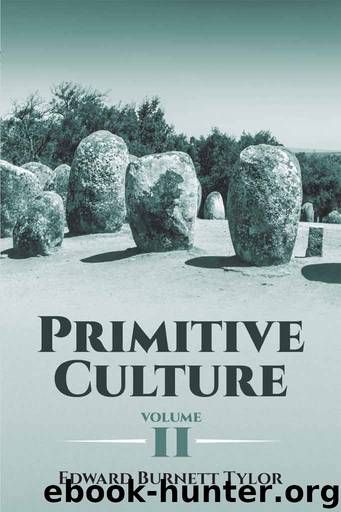Primitive Culture, Volume II by Tylor Edward Burnett;

Author:Tylor, Edward Burnett; [Edward Burnett Tylor]
Language: eng
Format: epub
Publisher: Dover Publications
Published: 2016-09-24T16:00:00+00:00
CHAPTER XVI.
ANIMISM—continued.
Higher Deities of Polytheism —Human characteristics applied to Deity —Lords of Spiritual Hierarchy —Polytheism : its course of development in lower and higher Culture —Principles of its investigation ; classification of Deities according to central conceptions of their significance and function —Heaven-god —Rain-god —Thunder-god —Wind-god —Earth-god —Water-god —Sea-god —Fire-god —Sun-god —Moon-god.
SURVEYING the religions of the world and studying the descriptions of deity among race after race, we may recur to old polemical terms in order to define a dominant idea of theology at large. Man so habitually ascribes to his deities human shape, human passions, human nature, that we may declare him an Anthropomorphite, an Anthropopathite, and (to complete the series) an Anthropophysite. In this state of religious thought, prevailing as it does through so immense a range among mankind, one of the strongest confirmations may be found of the theory here advanced concerning the development of Animism. This theory that the conception of the human soul is the very “fons et origo” of the conceptions of spirit and deity in general, has been already vouched for by the fact of human souls being held to pass into the characters of good and evil demons, and to ascend to the rank of deities. But beyond this, as we consider the nature of the great gods of the nations, in whom the vastest functions of the universe are vested, it will still be apparent that these mighty deities are modelled on human souls, that in great measure their feeling and sympathy, their character and habit, their will and action, even their material and form, display throughout their adaptations, exaggerations and distortions, characteristics shaped upon those of the human spirit. The key to investigation of the Dii Majorum Gentium of the world is the reflex of humanity, and as we behold their figures in their proper districts of theology, memory ever brings back the Psalmist’s words, “Thou thoughtest I was altogether as thyself.”
The higher deities of Polytheism have their places in the general animistic system of mankind. Among nation after nation it is still clear how, man being the type of deity, human society and goverment became the model on which divine society and government were shaped. As chiefs and kings are among men, so are the great gods among the lesser spirits. They differ from the souls and minor spiritual beings which we have as yet chiefly considered, but the difference is rather of rank than of nature. They are personal spirits, reigning over personal spirits. Above the disembodied souls and manes, the local genii of rocks and fountains and trees, the host of good and evil demons, and the rest of the spiritual commonalty, stand these mightier deities, whose influence is less confined to local or individual interests, and who, as it pleases them, can act directly within their vast domain, or control and operate through the lower beings of their kind, their servants, agents, or mediators. The great gods of Polytheism, whose dominion thus stretches far and wide over the world, are not, any more than the lower spirits, creations of a civilized theology.
Download
This site does not store any files on its server. We only index and link to content provided by other sites. Please contact the content providers to delete copyright contents if any and email us, we'll remove relevant links or contents immediately.
Born to Run: by Christopher McDougall(6897)
The Leavers by Lisa Ko(6807)
iGen by Jean M. Twenge(5164)
Sapiens by Yuval Noah Harari(5125)
The Kite Runner by Khaled Hosseini(4954)
Spare by Prince Harry The Duke of Sussex(4791)
Bullshit Jobs by David Graeber(3837)
Machine Learning at Scale with H2O by Gregory Keys | David Whiting(3642)
Livewired by David Eagleman(3535)
Never by Ken Follett(3535)
Goodbye Paradise(3453)
Fairy Tale by Stephen King(2953)
A Dictionary of Sociology by Unknown(2858)
Harry Potter 4 - Harry Potter and The Goblet of Fire by J.K.Rowling(2808)
The Social Psychology of Inequality by Unknown(2768)
The Club by A.L. Brooks(2748)
People of the Earth: An Introduction to World Prehistory by Dr. Brian Fagan & Nadia Durrani(2620)
0041152001443424520 .pdf by Unknown(2599)
Will by Will Smith(2581)
